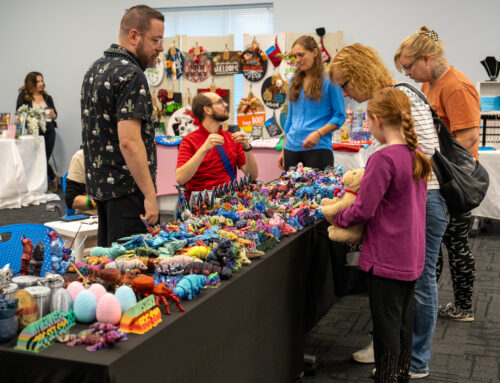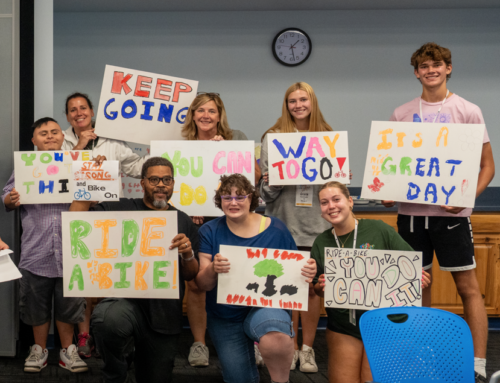It is easy to assume that ADEC is only visible in the community through our clients, facilities, staff, art and coffee, but we are far more prevalent than that and you probably didn’t even realize it.
When you were waiting in line at the BMV to get your driver’s license or registration, we were there. When you had that nice relaxing cookout, kayaking and fishing afternoon at Potato Creek State Park with your family, we were there. When you drove past an Indiana Department of Transportation road construction site, we were there. If you have ever visited an Indiana State Police station (hopefully, voluntarily), yes, ADEC was there as well.
Just how did ADEC find its way into all of these places and other state facilities across the Hoosier state? It comes through our most widely-distributed and perhaps least-known social enterprise vehicle – silver linings trash bags. While clients learn job skills on the floor of “the shop” at ADEC Industries, all of that work has to go into something and silver linings trash bags are the most popular output of the labor.
Sold through INARF’s Ability Indiana program – which has a non-compete clause within 10% for state agency business – ADEC’s silver linings trash bags are distributed from Elkhart to Evansville and countless points inbetween. Additionally, the bags are sold through industrial supply giant Fastenal to a variety of corporations around the Great Lakes region. Several local companies including local Centier Bank branches, Goshen’s Triangle Rubber and Edwardsburg’s MDI Inc. also buy them directly through ADEC Industries. You too can buy directly from us by calling (574) 295-3167 and they will soon be available once again at Gaining Grounds Coffee House.
If you are on state-managed property almost anywhere in Indiana, you are probably no more than 100 feet from something that makes the life of an ADEC client just a little brighter.
“Silver linings serve the community silently, but they do serve the community very well,” vice president of community outreach Cherri Peate said. “You wouldn’t know it, but they are a perfect example of our social enterprise’s goal of two-way community involvement. On one hand, the steady stream of orders to fill provides a regular opportunity for our clients to learn important job skills. At the same time, if you know they are there, you can see ADEC’s handiwork all over the place keeping our community tidy.”
From orders to manufacturing logistics to shipping, plenty of the effort which makes silver linings shine falls on ADEC Industries manager Bob Reynolds. In addition to overseeing assembly and fulfillment of the shop’s many general work orders from the local business community, Reynolds serves as the driving force behind silver linings – something which serves both the clients and the state quite well.
“It gives our client-workers a chance to be productive in the community,” Reynolds said. “We are not a job shop any more. We are community employment. One of the biggest benefits (to buying silver linings) is keeping our clients employed and giving them real world training in a production setting.
“One of the benefits from the social enterprise aspect is that you have individuals and corporations that support ADEC by purchasing our goods. We are a feel-good story and have an impact in the community. Customers realize that they’re going to be benefitting somebody. This isn’t a corporation. This isn’t a conglomerate. This isn’t Hefty. This is a small operation that has an impact in the community on people with physical and intellectual disabilities.”
The pandemic may have changed many components of how the now-solely competitive integrated employment ADEC Industries looks and operates, but Reynolds has remained the factory’s steadfast rock. The sleeker ADEC Industries continues to turn out quality trash bags which keep customers coming back while also providing an opportunity for ADEC clients. After decades of working in the supply chain management realm for several companies around the area, he feels like he has found a home.
“The people at ADEC Industries are one of the tangible things that keeps me around,” Reynolds said. “At this point in my life, I could make more money going elsewhere. But the job satisfaction with what I do, and the client interaction, makes the difference. I take an extreme amount of pride in the work that I do. It’s one of the things that keeps you around. We have employee appreciation to a level you don’t have in the corporate world.
“It’s a different atmosphere that you can enjoy and (the clients) can participate in the decisions. I’m still the boss but, at the end of the day, I know that when I walk out of here, I can shut the switch off knowing that I did the best I could. With the client interaction, they look forward to being here. That makes my job a lot easier. They WANT to be here. A lot of people that have a job, it’s 50/50 whether they want to be there or not. Not here.”
That camaraderie helps ensure that the trash bags aren’t, well, trash. Like the agency behind them, a model organization of its kind in Indiana, ADEC’s reputation is the opposite of garbage. Oddly, ADEC’s work containing garbage reflects so many of the values and professional attributes ADEC holds dear – quality, employment and community, among others.
You have to know where to look, but ADEC’s goal of being omnipresent in the community is palpable. Through silver linings, you can see ADEC almost anywhere.









